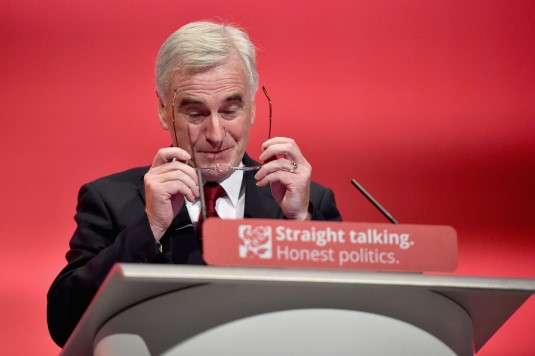John McDonnell is Right about Scotland

Let's consider Labour's strategic dilemma in Scotland. The party generally is against Scottish independence and would prefer either the UK, or some reformed, federalised successor state to continue with Scotland as an integral part of it. The latter is my view, as it happens. And yet the people Scottish Labour needs to win over to become the dominant political power in the land again have largely deposited their identification with our party in the bin and transferred loyalties to the SNP. And, to be honest, who can blame them? Labour's leadership of the Better Together campaign was an abject disaster for the party. It wasn't so much appearing on platforms with Tories that was the issue - I doubt few were turned off by a then largely-unknown Ruth Davidson ostentatiously clapping Gordon Brown at one of his animated speeches. It was seeing Labour sharing politics with the likes of Dave and Osborne, and parroting the very same attack lines. The Yes campaign and the SNP framed their movement as an anti-establishment insurgency, and Labour, the party that had Scotland all sewn up for decades, myopically situated itself at logger heads against its own voters. Instead of a positive case for sticking with the UK, apocalyptic vistas and miserabilism were its preferred fare. And thus apocalypse and untold misery were duly visited upon the party less than a year later.
It wasn't just the referendum that destroyed Scottish Labour. The withering of the party's roots, the long stranglehold on politics, its stupid strategy of opposing the SNP government from the right, this is what the Scottish Labour establishment did. It was less the case of devolution and the Holyrood parliament that opened the doors to the SNP, it was the complacency and failures of Scottish Labour to renew itself and adapt. How then to pull the situation back? As plenty of people have noticed, the wave of Corbynism that transformed the party's fortunes in England and Wales barely made a dent in Scotland. Though the party was able to claw back six more seats in 2017, its support grew by fewer than 10,000 votes, and prior to this there was no Corbynmania, no swamping of constituency parties by an avalanche of new members. This was because the same kinds of people who responded to the Corbynist opening elsewhere had already been activated and politicised by the referendum, and owed their allegiances, in the main, to the SNP. And in 2017 Scottish Labour didn't even try to win over these left leaning voters. It doubled down on a core vote strategy aimed squarely at unionist voters, up to and including local arrangements with Tories to keep the nationalists out. What a grotesque turn of affairs - but one native to the constitutional cretinism of the Labour unionist establishment.
Naturally, Scottish Labour wants unionist voters to, um, vote for it. The problem is they are a declining constituency. Its old base in industrial trade unionism, as the Scottish corollary of leveraging the bargaining power of labour to extract concessions from the bosses, and social democratic legislation from the (UK) state has largely evaporated. The base of Scottish unionism, like its cousin in Northern Ireland, is not replacing itself. Even more than the case in Ulster, in terms of mass purchase unionism is a legacy ideology. The problem with Scottish Labour is its bureaucracy, networks, and governing elite were drawn from these layers well into the Blair years and remain so situated, even though the constituency is thinning and Labour are forced to compete with the Tories for hegemony over it, while leaving the loyalties of the bulk of SNP voters uncontested. A cracked strategy that can only compound Labour's marginality and doom it to a dwindling fate.
It doesn't have to be like this. Plenty of unionist Labour voters would still respond to a strong left platform even if our Scottish manifesto doesn't dribble sycophancy over the monarchy and the UK's cherished institutions. And so, the election of Richard Leonard as leader was definitely a step in the right direction. But 18 months on little has changed, and why? Because the majority of people, people who should be our people, believe the SNP are doing an okay job in government and that they offer a vision of a Scotland that could work for them. Meanwhile Labour is associated with the status quo, and one set on taking us all put of the European Union in defiance of the preference of Scottish voters. Labour are perceived an author of Scotland's problems, not a solution to them.
In this sense, something has to give. For Labour to get a hearing it needs a position on the national question that can begin a conversation with progressive voters instead of repelling them. Independence and the hopes and interests bound up with it aren't going to disappear the longer you deny a referendum. On the contrary, given how much has changed since 2014 - particularly with regard to Brexit - the more you're stoking support for one. Therefore, John McDonnell's suggestion that Westminster should not have a veto on an independence vote is the starting point of rethinking how the constitution should work. Devolving more power to Holyrood, including the hand over of the prerogative of determining Scotland's self-determination is not pandering to nationalism, as the likes of Ian Murray argue, but a sensible way of undercutting it and pitching for the SNP's voters. Given Scottish Labour is on the trajectory of long-term decline, the situation needs turning around. What is there to lose apart from the shambling gait of a party on the verge of collapse?
Comments
Post a Comment